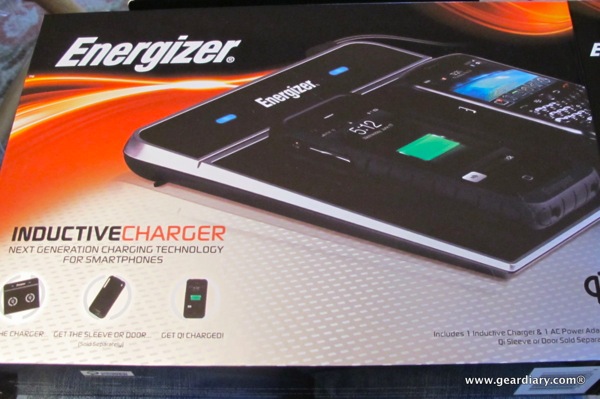
I love the idea of inductive charging whereby you can simply lay your device on a base-station and have it recharged without having to plug anything into it. I love the idea but, until now, not the execution. We’ve looked at a few systems and, while they all worked as promised, the requisite charging case or sleeve was too heavy and bulky for daily use. When Energizer offered to send us their newest system we jumped at the chance. Yes, we weren’t expecting too much but we were HOPING the improvements were enough to make it usable beyond the review. Is it? Read on…
So here’s a look at Energizer’s new Inductive charging system, the Energizer Qi-Enabled 3 Position Inductive Charger.
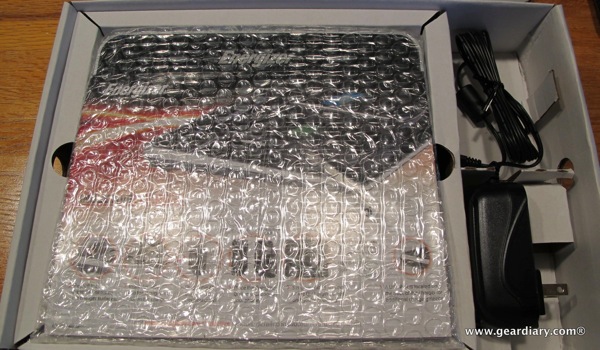
About the Energizer Inductive Charging System:
From Chinese philosophy, the vital force that flows within and animates all living things. The new universal standard for inductive charging as established by the Wireless Power Consortium (WPC).
When it’s got Qi, I can charge anything just by setting it down on any Qi pad. Qi is the new universal standard for inductive charging. It’s a common language for inductive chargers and devices to talk to one another. So any device with a Qi-enabled accessory or with Qi built directly into it can charge on any Qi inductive charging pad.
Inductive charging is what happens when two devices—one designed to send power and the other designed to receive it—touch one another and energy is transferred between them. Until today, these two devices had to be designed specifically for each other. But Qi changes all that.
Think back to the first time you heard of Bluetooth® or Wi-Fi™. Just like those technologies set the standard for hands-free and Internet connections, Qi is how everyone will use inductive charging in the future. Established by the Wireless Power Consortium (WPC), Qi allows you to universally charge your Qi-enabled smartphones, cameras, mp3 players and anything else that uses up to 5W without directly plugging in those devices. We anticipate Qi will be widely adopted by consumer electronics device manufacturers and other members of the WPC, providing you with the freedom to charge all Qi-enabled devices on a single charging station without multiple cords and eventually without accessories.
Because Qi is the next generation of inductive charging.
More on Inductive Charging:
If you’re the kind of person who doesn’t need all the details, you can skip ahead to see which devices already have Qi and what Qi can do for you in the future. Because we’re about to get technical.
Inductive charging is the next generation of intelligent charging. By using an electromagnetic field to transfer energy, charging pads are able to intelligently communicate back and forth with the devices they’re charging.
First, a transmitter awaits a signal from a receiver that it needs power. When it detects a receiver, the transmitter sends electricity through a transmitting coil, creating an electromagnetic field with a specific frequency. The receiving coil, designed to accept energy at that frequency, then turns that energy into something we all need, more battery life. When the receiver’s battery is full, the receiving coil tells the transmitter to stop sending energy, effectively telling the transmitter to standby. Devices talking intelligently to one another over beams of energy may not be flying cars, but it’s still pretty futuristic.
Just as inductive charging is the first generation of intelligent charging, Qi is the next generation. Before Qi, not all transmitters and receivers were designed to work together. They didn’t all speak the same language. This is why the Wireless Power Consortium came together and made Qi the universal standard for inductive charging. Now, with Qi Inductive Charging, all Qi-enabled devices that need up to 5 watts of power have coils that transmit and receive the same frequency. So now and in the future, any Qi-enabled device will work with any Qi charger.
That’s the power of Qi. That’s charging into the future.
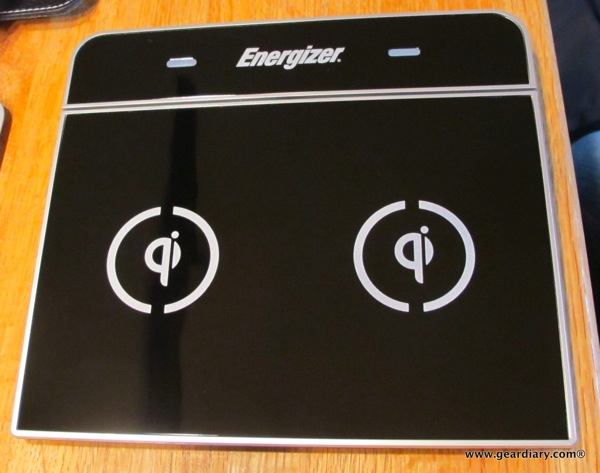
The base station for the system is a fairly simple deal. It is a plastic base with two sides that are clearly identifiable as the charging “spots”. All you need to do is place a device that is wearing a special sleeve in the general area, and the charging process begins.
The base station also has a USB port in the back so you can charge devices that don’t have sleeves available … yet! I used it for my iPod touch last night, and it worked great but, unfortunately, it does not have enough juice to charge the iPad. That’s a bummer but not surprising, truth be told.
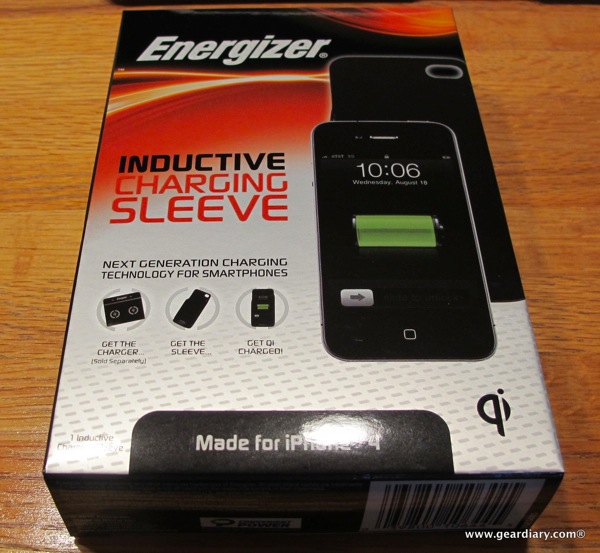
The system does not come with device sleeves, so you need to figure that in if you are considering buying this system. I actually appreciate the fact that all sleeves and cases are ala carte, since that means you don’t pay for something you are not going to use.
At the same time, there are only a few cases and sleeves currently available, so choices are limited. Hopefully they will start rolling out additional ones, and soon.
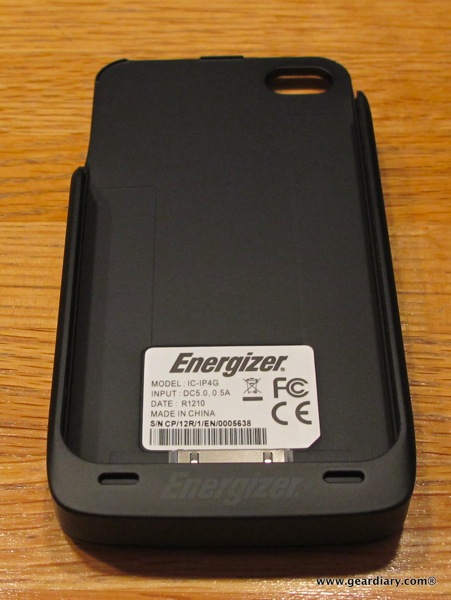
Fortunately they have a sleeve for the iPhone 4 that is already out, and it is pretty slick. It is well made, has a nice soft-touch feel and doesn’t add a lot of bulk to the iPhone.

I appreciate the fact that the back of the sleeve doesn’t have the “induction plate” that made earlier induction charging systems so unappealing to me.

It looks a bit like an external battery you would get from Mophie. In fact, I would love to see some added battery functionality built into it in a future iteration.
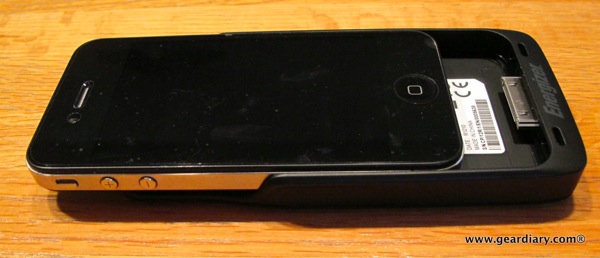
To use the sleeve you simply slide the iPhone into it. It is a tight fit so, obviously, you cannot have a back film protection on it to use the sleeve. Screen protectors, however, are just fine.
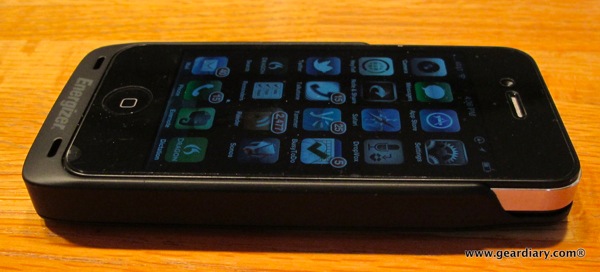
It makes for a nice package and, in the process, gives the sides, back and bottom nice protection.
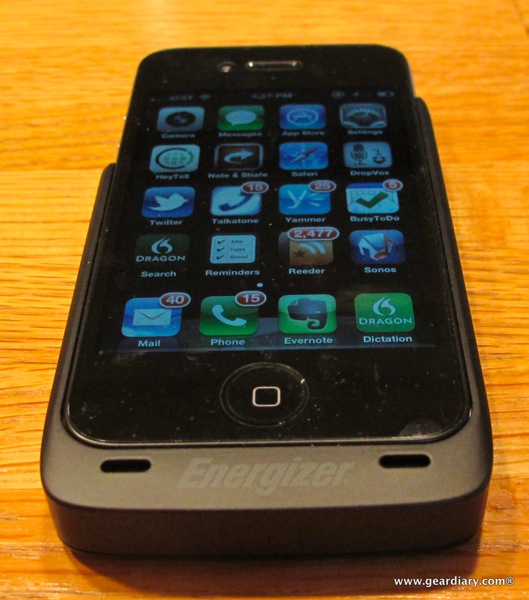
The sleeve includes pass-throughs for the speaker and microphone. Personally I could do without the Energizer name on the bottom.
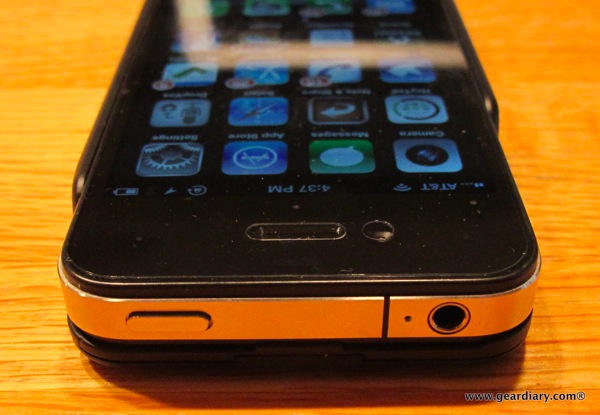
The sleeve does leave the top exposed which might be an issue for some.
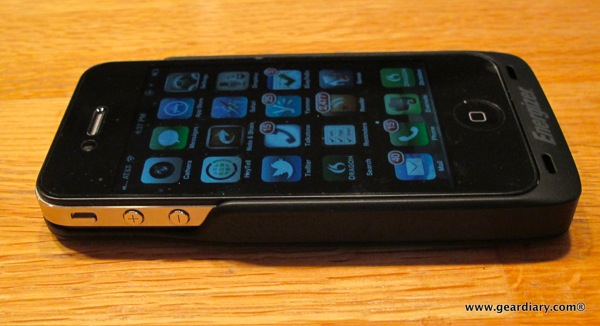
It does, however, mean that, for once, the volume buttons and mute toggle are completely exposed and accessible.
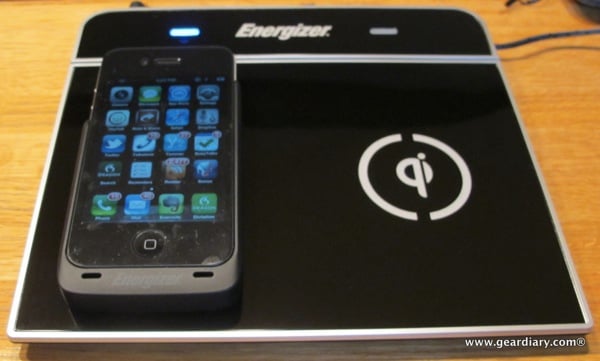
From there charging my iPhone is as simple as placing the iPhone on the Charging Station. So long as it is positioned with the top of the iPhone toward the word “Energizer” and sitting roughly over one of the two circles the phone will begin to charge. The blue light to the left or right of “Energizer” will shine when charging is occurring. And, better still, when the device reaches full charge the Blue light goes out and the flow of energy ceases.
It is, by far, the best and most refined induction charging system we have seen. For those of you who want to know a bit more about the technology…
Qi was created by the Wireless Power Consortium (WPC), an international cooperation of companies that came together with the common belief that all portable electronic devices should have global compatibility. Energizer® is an associate member of the WPC and is proud to have helped shape the future of worldwide inductive charging with Qi.
Chances are you’ve never heard of the WPC, but there’s an even greater chance that you do use its members’ products every day. WPC members provide goods and services across many different fields, from companies that run wireless telephone services to those that manufacturer phones, smartphones, cameras, music players and other everyday electronics. With the WPC more than doubling in size in 2010, we’re on the verge of a Qi charging revolution. As all current and future WPC members start adopting the global standard, it won’t be long before we see Qi—the next generation of inductive charging—built directly into many devices.
I’m impressed with the system and am seriously considering keeping the charging sleeve on my iPhone. There are, however, a few things that might result in that not happening. First, the sleeve does not have a charging pass-through that would allow me to use a micro-USB plug to charge the phone when the base station is not available. Since I NEVER make it through the day on a single charge I need to be able to top off my iPhone as needed. That means I would, at the minimum, need to buy an additional charging station for my study at work and that begins to get pricey. Second, I have other devices that also need charging and there are currently no sleeves available for them. At a minimum I would need to have a sleeve for my iPod touch before I could fully adopt induction charging. I have no doubt there will be a nice selection of cases and sleeves available some time soon but, for now, the selection is a bit too limited for my taste.
So what are my suggestions for this evolving technology? Well in the case of the Energizer system there need to be more cases available, the cases need a micro-USB option and they really should offer a package with two charging stations since most users will need charging in two locations. Oh, and I really would not mind if they dropped the “Energizer” imprint on the front.
All of that noted, this is, by far, the best option yet for this convenience way to keep your growing number of portable devices charged.
You can check out the system on Energizer’s site.
MSRP: Charging base is $89 ($67 through our Amazon Affiliate Store); iPhone 4 Sleeve $34.99 ($25.24 in our Affiliate Store)
What I Like: Low-profile sleeve for iPhone 4; small, easy to use charging base; USB charging port on the base station; sleeves no longer have the heavy thick induction plate on the back
What Needs Improvement: Small selection of cases and sleeves currently available; Sleeve does not have an alternative charging method built into it; Logo and name prominent on the front of the sleeve; USB charging of iPad not supported
